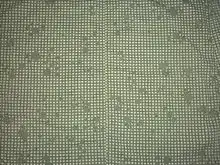Desert Night Camouflage
The Desert Night Camouflage pattern is a two-color grid camouflage pattern used by the United States military during the Gulf War. It was designed to aid soldiers in concealment from Soviet-based night vision devices (NVDs).[1] The pattern is now considered obsolete due to the increase in capability of foreign night vision devices.[2]
| Desert Night Camouflage | |
|---|---|
 Fabric sample of the DNC | |
| Type | Military camouflage pattern |
| Place of origin | United States |
| Service history | |
| Used by | See Users |
| Wars | |
Even with the pattern being obsolete, it has gained interest due to the unusual looks.[2]
History
During the Persian Gulf War, clothing sets in this pattern were issued to U.S. soldiers, designed to be worn over the issued six-color Desert Battle Dress Uniform during nighttime operations.[3]
No night-specific pattern has been created to replace this gear for nighttime use in a desert environment, as advancements in infrared reflectance technology in first the Desert Camouflage Uniform, and finally the Marine Corps Combat Utility Uniform and Army Combat Uniform have eliminated the need for a separate nighttime overgarment.
Design
The DNC's design was made from cross hatches and blotches, which was supposed to break up the wearer's image when looked at through various NVDs.[4][5] The colors consisted of Axolotl and Laurel Green.[6] The interior of the clothes are made from olive drab green.[7]
The design was made for a parka, overpants and boonie hat.[4]
Criticism
%252C_by_Donna_J._Neary.png.webp)
During the Gulf War, one scout/sniper section of a Marine Corps battalion conducted a night test comparing the visibility of the desert night camouflage clothing with six-color desert uniforms and winter overwhites. The night camouflage clothing proved to be more visible than both the day desert uniforms and winter overwhites when viewed though an AN/PVS-5 night vision device.[8]
The pattern was seen as effective on NVDs that were made in the 1970s.[5]
Users
 United Kingdom: Used by British special forces.[9]
United Kingdom: Used by British special forces.[9] United States: Used by American troops.[5] Also used by American special forces units.[9]
United States: Used by American troops.[5] Also used by American special forces units.[9]
References
- "Who Made That Strange Pixelated Camo?". 22 March 2019.
- "Gulf War Desert Night Camouflage". 21 March 2016.
- "The Complex Guide to Camo". Complex Networks.
- "Archived copy". www.battlefront.com. Archived from the original on 24 May 2007. Retrieved 15 January 2022.
{{cite web}}: CS1 maint: archived copy as title (link) - Dougherty 2017, p. 82.
- https://www.schemecolor.com/desert-night-camouflage.php
- "Smock (Desert night camouflage): US Army".
- "Night camo clothing (Ed Rudnicki)". yarchive.net.
- https://militarymachine.com/military-camouflage-patterns/
Bibliography
- Dougherty, Martin (2017). Camouflage at War: An Illustrated Guide from 1914 to the Present Day. London, UK: Amber Books. ISBN 978-1782744986.
.jpg.webp)